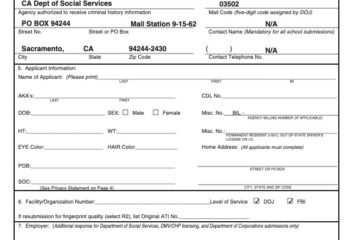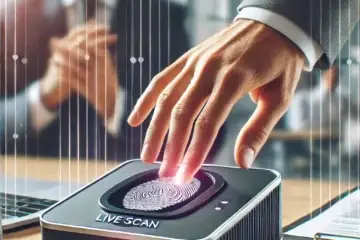Many countries require an FBI background check as part of visa applications, work permits, or residency processes. This document verifies an individual’s criminal history or confirms a clean record. If you are planning to travel, work, or live abroad, obtaining an FBI background check is essential. The process involves requesting a copy of your criminal history, submitting fingerprints, and ensuring proper authentication. Understanding the necessary steps can help prevent delays and make the experience smooth.
Understanding the FBI Background Check
The FBI background check, officially known as an Identity History Summary Check, is a report detailing an individual’s criminal record based on fingerprint submissions. It includes arrests, charges, and any other law enforcement records linked to an individual. If no criminal record exists, the report will confirm a clean history. Many foreign governments, employers, and immigration authorities require this document to assess the background of individuals applying for visas, work permits, or residency.
Who Needs an FBI Background Check for Travel?
Certain travelers need an FBI background check depending on their purpose of travel. Many countries require this document for long-term visas, including work visas, student visas, or residency permits. If you are applying for a job abroad, especially in sensitive sectors like education, healthcare, or finance, an FBI background check is often mandatory. Some travel programs, including those involving volunteer work or government contracts, also request this document. Individuals adopting children from other countries or sponsoring a foreign spouse may need to provide a criminal history report for legal and security reasons.
How to Apply for an FBI Background Check
To apply for an FBI background check, you must submit a request to the FBI through one of the available methods. The FBI offers a direct application, where you submit your request through the official FBI Criminal Justice Information Services (CJIS) Division. You can also apply through an FBI-approved Channeler, which is a private agency authorized to process background checks faster than the FBI directly.
Steps to Obtain an FBI Background Check
The first step is to complete the application form. The standard form used for this request is the FD-258 Fingerprint Card. You must fill out your personal details, including full name, date of birth, and contact information.
The next step is fingerprinting, which is a crucial part of the background check process. The FBI requires fingerprints to verify an individual’s identity. You can get fingerprinted at a local police department, a private fingerprinting agency, or an FBI-authorized channeler. Many private agencies offer live scan fingerprinting, which is faster than traditional ink-based fingerprinting.
After fingerprinting, the completed form must be submitted to the FBI. If applying directly, you must send your fingerprint card, completed application, and payment to the FBI’s CJIS Division. If using an FBI-approved Channeler, the agency will submit the request electronically on your behalf.
Processing Time and Fees
The FBI background check processing time depends on the method used for submission. Direct submissions to the FBI take up to four weeks, while FBI-approved Channelers can process requests within 24 to 72 hours. If applying directly, the standard fee for an FBI background check is $18, payable by credit card, money order, or certified check. Channelers may charge additional fees for faster processing.
Receiving Your FBI Background Check Report
The FBI provides results in electronic or physical format. If you select an electronic copy, you will receive an email with a secure link to download the report. If you choose a mailed copy, the physical report will be sent via the United States Postal Service. Some travelers prefer both formats to ensure they have backup copies in case of document loss or delays.
Authenticating the FBI Background Check for International Use
Most foreign governments require authentication to verify the legitimacy of an FBI background check. Authentication is essential for ensuring the document is accepted by immigration, employers, or government agencies abroad. There are two primary types of authentication: apostille certification and embassy legalization.
Apostille Certification for FBI Background Checks
If traveling to a country that is a member of the Hague Apostille Convention, an apostille is required. An apostille is a special certification that verifies the document’s authenticity for international use. Since the FBI is a federal agency, only the U.S. Department of State in Washington, D.C., can issue an apostille for an FBI background check.
To obtain an apostille, you must submit the original background check report to the Office of Authentications at the U.S. Department of State. The process usually takes several weeks, so it is advisable to plan ahead. Some third-party services can expedite apostille processing for an additional fee.
Embassy or Consular Legalization for Non-Hague Countries
If the destination country is not part of the Hague Apostille Convention, the document must go through embassy or consular legalization. This process includes authentication by the U.S. Department of State followed by legalization at the embassy or consulate of the destination country. Each embassy has specific requirements, including translations and additional forms. Processing times vary by country, so checking with the relevant consulate is essential.
Common Challenges and How to Avoid Delays
Many applicants face challenges during the background check process. Incomplete fingerprint submissions, missing documents, or incorrect application details can lead to rejections. Ensuring fingerprints are properly captured at an authorized facility helps avoid delays.
Another issue is processing time. Since the background check and authentication process can take weeks or even months, applying as early as possible is recommended. Using an FBI-approved Channeler and expedited apostille services can significantly speed up processing.
Translation requirements also cause delays. Some countries require FBI background checks to be translated into their official language by a certified translator. If translation is needed, ensure the translation service is accredited and recognized by the destination country’s government.
Alternative Background Checks for Travel
In some cases, an alternative background check may be accepted. Some countries allow local police clearance certificates instead of FBI background checks. If the country permits a state-level background check, you may request a report from your state’s law enforcement agency.
If applying for a temporary visa, certain countries may not require a full FBI report. Checking with the respective embassy or consulate can clarify whether an alternative background check is acceptable.
Final Steps Before Traveling
Once you have obtained your FBI background check, verified its accuracy, and completed authentication, you must check the specific submission requirements of your destination country. Some embassies require background checks to be submitted within a specific timeframe, often within three to six months of issuance. Keeping extra copies of the report and all authentication documents ensures a smooth visa or residency application process.
Conclusion
Getting an FBI background check for travel involves submitting fingerprints, requesting the report, and obtaining authentication for international use. The process varies depending on the country’s requirements, with some needing apostille certification and others requiring embassy legalization. Ensuring accuracy in the application, planning ahead, and using expedited services when necessary can help avoid delays. With proper preparation, travelers can obtain their FBI background check efficiently and meet international legal requirements with ease.
Also Read: Understanding the Role of Notaries in Estate Planning



0 Comments